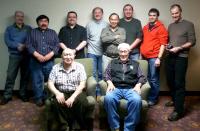IPinCH is working with the Inuit Heritage Trust (IHT), an IPinCH partner since 2008, on an initiative designed to enhance the management and protection of Inuit Cultural Heritage in Nunavut. In late March, IPinCH representatives met with IHT trustees and staff in Yellowknife to begin developing an initiative that addresses IHT concerns around intellectual property and cultural heritage and that would fit with IPinCH’s mandate.
Representing IPinCH at the meeting were George Nicholas (Project Director), Catherine Bell (Project Co-Investigator), and Brian Egan (Project Coordinator). The IHT contingent at the meeting consisted of members of the Board of Trustees, including Luke Suluk (President), Steve Mapsalak (Secretary-Treasurer), Nick Amautinuaq (Board Member), and Andre Tautu (Board Member), as well as staff members William Beveridge (Executive Director), Ralph Kownak (Heritage Manager), Sunvar Mortensen (Finance Manager), Torsten Diesel (Project Manager), and Ursula Issaluk (Office Assistant).
This meeting was conceived as a planning session for a workshop to be developed and presented by IPinCH, in partnership with the IHT, that would provide an introduction to intellectual property issues and explore legal and other means of protecting Inuit cultural heritage from unwanted or inappropriate commercialization. At the meeting, it quickly became apparent that the IHT were concerned about and interested in a much broader range of intellectual property and cultural heritage concerns, not only dealing with the commercialization of Inuit heritage and associated economic and trade concerns, but also with the identification, protection, and management of heritage sites (e.g., archaeological sites, sacred sites) and the traditional knowledge associated with them, with cultural tourism and appropriate research protocols, and with a wider variety of intellectual property matters.
What emerged from the discussion was a realization that the IHT was interested in engaging IPinCH assistance in the development of a comprehensive heritage management plan based on Inuit values. Much of the rest of the meeting was spent exploring how such a plan would encompass all aspects of Inuit heritage, from archaeological sites to language to cultural tourism to marketing Inuit-produced or –inspired products. Topics in the discussion included: education opportunities, flow of economic and other benefits, lack of separation between tangible and intangible heritage, research ethics, and questions about who controlled the research process.
The meeting ended with agreement to reframe the proposed future workshop to be a meeting of IHT representatives, IPinCH team members, and other key individual and organizations that could assist with the development of a comprehensive heritage management plan. It is important to note that this proposed meeting, to be held in either the Fall of 2013 or the Spring of 2014, would be a strategizing meeting and not one in which a heritage plan would be devised.
In moving forward with this initiative, all agreed on the importance of being realistic about what IPinCH can provide as well as what can be accomplished in this collaboration. Developing a heritage management plan is a substantial task and there is much preparatory work to be done even prior to the proposed strategizing meeting. We agreed that IPinCH’s logical contribution, at this early stage, is to take on some of the background research that can inform this effort, including identifying and compiling examples of pertinent heritage plans (particularly those that foreground Indigenous interests and needs), sharing examples of appropriate research policies, protocols, and methods (such as those coming out of IPinCH case studies), and pulling together information on communication strategies, possible funding sources, and other useful resources (e.g., a bibliography).
In summary, this was a very successful meeting, in fact a breakthrough in getting at some of the larger underlying issues and heritage-related concerns affecting the Inuit, which have or can have an impact on their lives, well-being, and identity. The discussion initiated with the IHT, while still at a very early stage, indicates the possibility of developing an exciting and useful initiative relating to cultural heritage and intellectual property issues in Nunavut.
For more information on this initiative, contact George Nicholas (nicholas@sfu.ca) or Brian Egan (ipinchpm@sfu.ca).
Photo: In mid-March, George Nicholas, IPinCH Project Director (center) and Brian Egan, IPinCH Project Coordinator (right) travelled to Yellowknife in the Northwest Territories (where it was -30 degrees!), to meet with members of the Inuit Heritage Trust to discuss a future workshop to develop a comprehensive heritage management plan for the Inuit.






